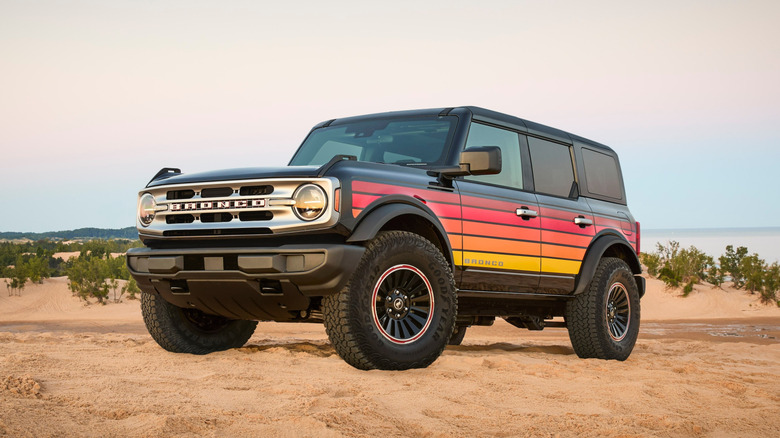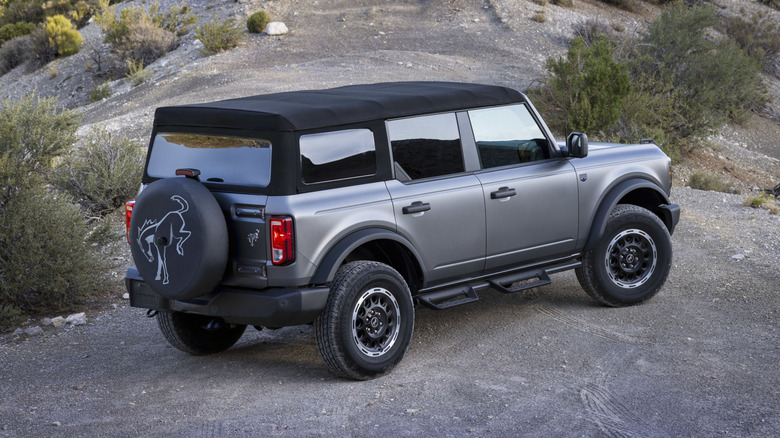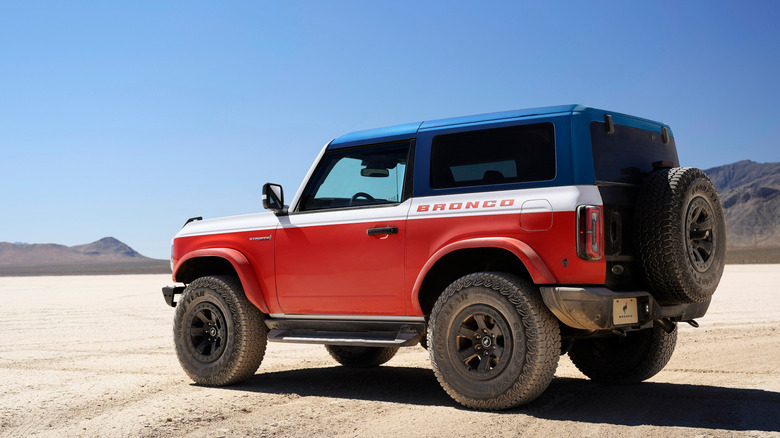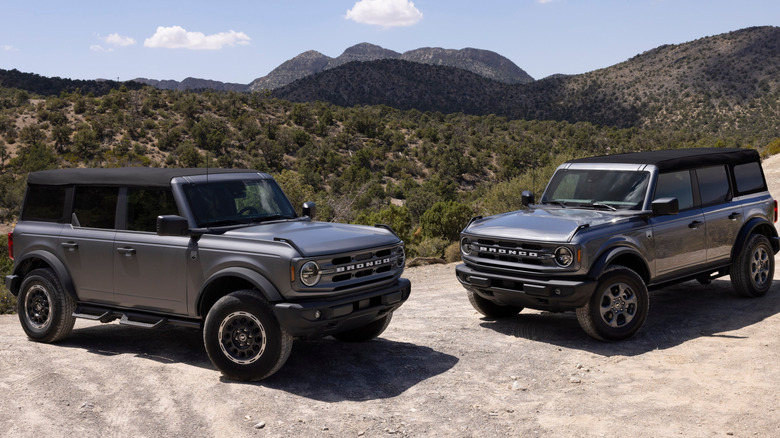Common Problems You Might Experience With The Ford Bronco (According To Owners)
The Ford Bronco is one of the most distinctive and iconic SUVs on the road today, perhaps surpassed only by the Wrangler in its ubiquity on American roads. This is a truck with historical provenance dating back to 1966, spanning six main generations and dozens of configurations, a trend which continues to this day, for better or worse. That's because while, yes, it's certainly distinctive and famous, it's not without its faults, many of which are inherent to the Bronco's design architecture and powertrain.
For the sake of brevity, this article will focus exclusively on the modern Bronco design, owing to its direct continuity to the original in terms of design philosophy, utility, and general characteristics. Some vehicles, such as the Jeep Cherokee, changed substantially between generations, going from a true compact SUV to a crossover, for instance. So in that case, we have an article detailing the reliability of the classic Cherokee XJ, which excludes the modern variants. By contrast, the Bronco has largely stayed the same throughout its history — a bona-fide, unapologetic 4x4, albeit with far larger proportions than the original. However, given that it offers the same experience and many have a fair number of hard miles on them, the latest model provides us with the fairest assessment.
That said, is the new model Bronco reliable or not? It largely depends on the trim level and options you go for, and how you treat the truck. Obviously, don't expect miracles if it's been abused, but what about more specific design flaws? Well, the Bronco has those, too, from leaky roofs to grindy transmissions. Let's dive in and sift through the dirt on this truck, according to owners and experts alike.
Mechanical flaws of the modern Bronco
Let's begin with possibly the most important issues concerning the Bronco, namely those which are liable to leave you stranded. Most of these were ironed out several years ago, but they are still worth noting, especially if you're looking into the used market. Starting with the powertrain, the Bronco is available with a choice of a 2.3L inline four or 2.7L V6, both EcoBoost engines, though neither faced any significant mechanical faults that haven't been rectified. In particular, the 2.3L appears to be largely trouble-free, according to owners and mechanics. The same applies with the 2.7L, with the sole exception being a recall issued for faults with the exhaust valves, only applicable to a certain VIN range. Aside from this, many owners have reported issues with the manual transmission grinding its crawler gears, but that rounds out the brunt of the powertrain issues.
Electrical gremlins are another source of common issues for Bronco owners, ranging from basic software glitches and wiring malfunctions to system-wide faults requiring a visit to the dealership within days of receiving the truck. However, much like the powertrain, the actual number of people with these crippling problems appears to be relatively small, with common sources of grievances being the fuse box, camera warnings, and brakes behaving strangely. Not exactly the fun Easter eggs Ford hid on the Bronco deliberately.
Another somewhat unique and irritating issue that's been reported is the windshield wipers not functioning properly. During heavy rain, owners have reported that the wipers will slow down or simply stop working altogether, likely a design error leading to the wipers not being able to cope with heavy rainfall.
Quality control and fitment issues
Another common source of complaints relates to the general fit and finish of the Bronco. For instance, whether it's a hardtop or soft top, the roof has a tendency to leak due to bad seals — apparently, these trucks really dislike rainy conditions for whatever reason. Other owners complain about road noise, but that's to be expected considering it's a body-on-frame truck with removable body panels. It's more or less an expectation for it to be "rougher" than a Lexus, though it does retain some quality-of-life issues common to many newer vehicles. Also note that some Bronco years are better than others in general.
For example, owners have reported gremlins when dealing with the infotainment system such as frozen screens and glitches that disable major functions, with some requiring a hard reset to get it to work properly. Other specific issues include glitches with the backup camera and possibly battery connections. Software bugs could certainly be at play here, requiring updates to fix, but provided said updates are implemented, then these should cease to be this pervasive.
As for the general fit and finish, these are generally reserved to minor discrepancies, if they exist at all for most owners. In fact, many extoll the virtues of the Bronco in terms of the general build quality; aside from the aforementioned mechanical, electrical, and roof leaking points, it's still a Ford. It's not going to have Lexus levels of quality in terms of fit and finish, but it's certainly fitting for the MSRP, at least according to the owners who've driven these trucks.
Our methodology
Broncos are plentiful trucks, with a diverse array of fans using them for everything from suburban daily driving to dedicated off-roaders, all with factory or near-factory configurations. As such, the general breadth of ownership reports uniquely span multiple applications, given the truck's overbuilt nature. We've therefore taken into consideration all these different opinions in our assessments, focusing on inherent design flaws and common problems across all these types of owners. We've also looked at expert testimonials, such as experienced technicians and mechanics; and long-term owners with high-mileage examples, using dozens of sources.
Given that the Bronco is a truck, there's a certain amount of leeway to be expected with the general build quality. Two factors we've considered are that the general suspension profile of a body-on-frame vehicle with solid axles won't handle or feel like a regular road car, and the Bronco is a modern car with modern electronics. These electronics, like any other newer car, are prone to failures, though things will likely improve with age.
Lastly, we've also exempted older Broncos because the older you get, the more variation you're likely to encounter in how they run. Modern Broncos are more consistent in an unbiased analysis where survivorship doesn't present a major factor, therefore we've stuck with these models in the interest of objectivity.



